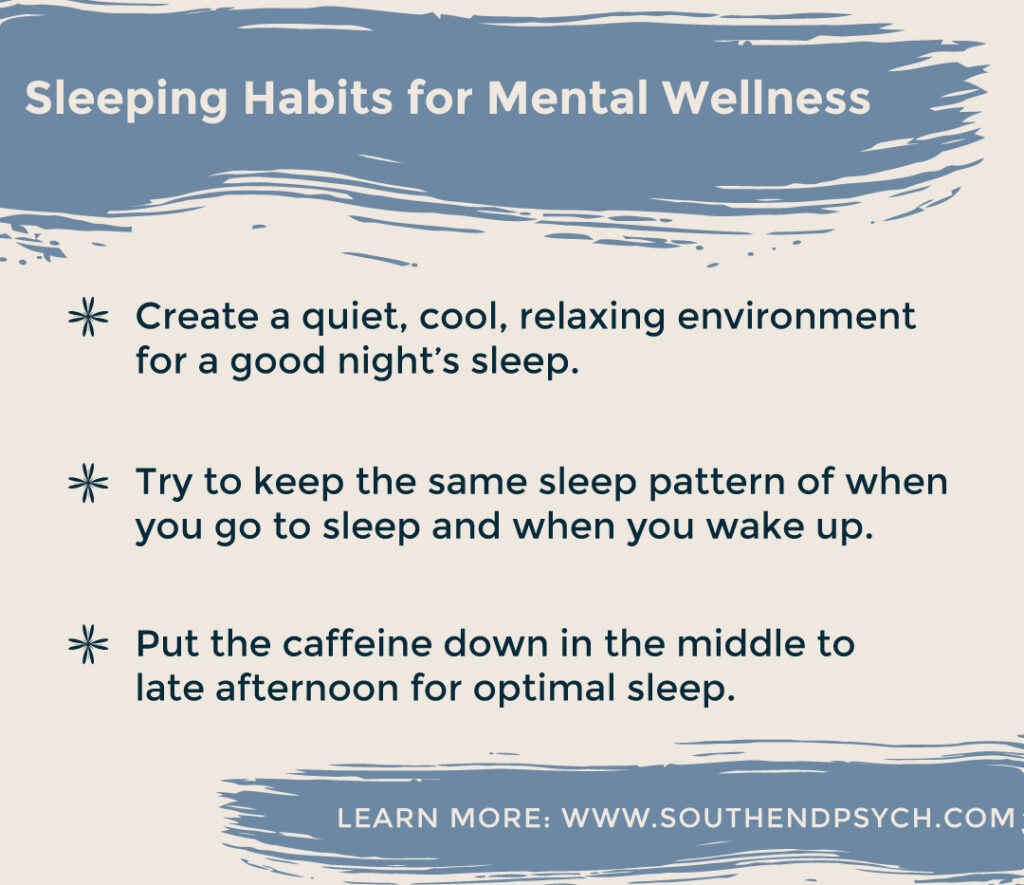The phrase “mental wellness” is becoming more and more common as we enter into this new year. Mental health in general is now widely accepted and for good reason.
Alison Seponara, a licensed professional counselor and author of the book “The Anxiety Healer’s Guide” says that mental health helps determine how you handle stress, relate to others, and make choices. This month, we’d like to encourage you to embrace a healthy mental wellness practice.
Nurturing our mental wellness can help with self-esteem, improved mood, reducing anxiety, clearer thinking and managing stress which ultimately leads to overall better health. Let’s dive into 5 ways we can develop and maintain mental wellness.
1. Sleep
Improve your memory, reduce stress and stay alert with good sleeping habits. Did you know that the CDC reported, people who averaged 6 hours of sleep or less per night were about 2.5 times more likely to report frequent mental distress than those who averaged more than 6 hours of sleep?
- Start by creating a quiet, cool, relaxing environment for sleep.
- Try to keep the same sleep pattern of when you go to sleep and when you wake up.
- Put the caffeine down in the mid to late afternoon.

2. Physical Health
Keeping your body active by getting outside for a nature walk, starting a new exercise routine or simply stretching daily can help reduce stress, anxiety and depression. This increases blood flow which helps get more oxygen through your body.
Another way to improve your physical health is through the foods you eat. Incorporating foods into your diet that are packed with mood-boosting nutrients like berries, omega-3 fatty acids (fish) and whole grains will naturally increase your defense against stress.
3. Nurture Relationships
Cultivating positive connections and nurturing our existing friendships can have a great impact on our mental health. Psychology Today says that when we show love and compassion to other people, it releases chemicals in the pre-frontal cortex and reward center of the brain that professionals refer to as the “Helper’s High.” People who help others report many positive mental and physical health benefits, including lower levels of stress, lower blood pressure, and relief from depression and physical pain.
4. Mindfulness
Jennice Vilhauer, Ph.D., Director of Emory University’s Adult Outpatient Psychotherapy Program in the Department of Psychiatry and Behavioral Science in the School of Medicine says that mindfulness allows you to have conscious awareness of what you are doing, so you can make choices to override automatic thinking and make positive changes in thoughts and behavior.
When you are mindful, you are able to observe events in a non-judgmental way, which allows you to detach from negative emotions, as opposed to being controlled by them. As a result, the way you respond to events in your life starts to change. Your emotions are better regulated, and you stop getting so upset, angry, or fearful over things you can’t control. You are also not flooding your brain with fear and worry about the future or resentments from the past, which has the profoundly positive effect of resetting your emotional state to calm and peaceful.
5. Stimulate The Brain
Learning a new skill or hobby this year can keep the brain healthy and active. These activities involve a combination of memory, decision-making and strategizing, which keeps the brain active and prevents dementia.
Know When Its Time to Reach Out
Southend Psychiatry is here as you navigate this new year. We can come alongside you to offer support and help. Contact Southend Psych today to inquire about appointment availability and get on your way to a better you.
Southend Psychiatry
Schedule your appointment today with one of our SouthEnd Psychiatry clinicians. Book your appointment online or call 1-800-632-7969 to get started today.



